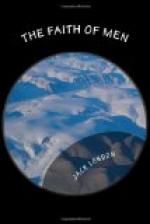He went down the street and bought a Seattle paper. It contained the same facts, though somewhat condensed. Corry and Mabel were indubitably married. Pentfield returned to the Opera House and resumed his seat in the game. He asked to have the limit removed.
“Trying to get action,” Nick Inwood laughed, as he nodded assent to the dealer. “I was going down to the A. C. store, but now I guess I’ll stay and watch you do your worst.”
This Lawrence Pentfield did at the end of two hours’ plunging, when the dealer bit the end off a fresh cigar and struck a match as he announced that the bank was broken. Pentfield cashed in for forty thousand, shook hands with Nick Inwood, and stated that it was the last time he would ever play at his game or at anybody’s else’s.
No one knew nor guessed that he had been hit, much less hit hard. There was no apparent change in his manner. For a week he went about his work much as he had always done, when he read an account of the marriage in a Portland paper. Then he called in a friend to take charge of his mine and departed up the Yukon behind his dogs. He held to the Salt Water trail till White River was reached, into which he turned. Five days later he came upon a hunting camp of the White River Indians. In the evening there was a feast, and he sat in honour beside the chief; and next morning he headed his dogs back toward the Yukon. But he no longer travelled alone. A young squaw fed his dogs for him that night and helped to pitch camp. She had been mauled by a bear in her childhood and suffered from a slight limp. Her name was Lashka, and she was diffident at first with the strange white man that had come out of the Unknown, married her with scarcely a look or word, and now was carrying her back with him into the Unknown.
But Lashka’s was better fortune than falls to most Indian girls that mate with white men in the Northland. No sooner was Dawson reached than the barbaric marriage that had joined them was re-solemnized, in the white man’s fashion, before a priest. From Dawson, which to her was all a marvel and a dream, she was taken directly to the Bonanza claim and installed in the square-hewed cabin on the hill.
The nine days’ wonder that followed arose not so much out of the fact of the squaw whom Lawrence Pentfield had taken to bed and board as out of the ceremony that had legalized the tie. The properly sanctioned marriage was the one thing that passed the community’s comprehension. But no one bothered Pentfield about it. So long as a man’s vagaries did no special hurt to the community, the community let the man alone, nor was Pentfield barred from the cabins of men who possessed white wives. The marriage ceremony removed him from the status of squaw-man and placed him beyond moral reproach, though there were men that challenged his taste where women were concerned.
No more letters arrived from the outside. Six sledloads of mails had been lost at the Big Salmon. Besides, Pentfield knew that Corry and his bride must by that time have started in over the trail. They were even then on their honeymoon trip—the honeymoon trip he had dreamed of for himself through two dreary years. His lip curled with bitterness at the thought; but beyond being kinder to Lashka he gave no sign.




